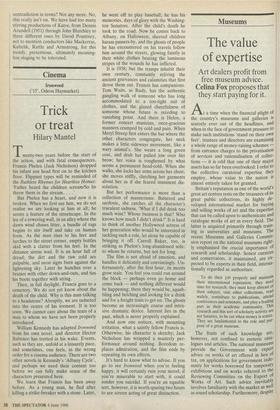Cinema
Ironweed
('15', Odeon Haymarket)
Trick or treat
Hilary Mantel
Twenty-two years before the start of the action, and with fatal consequences, Francis Phelen (Jack Nicholson) dropped his infant son head first on to the kitchen floor. Flippant types will be reminded of the Ruthless Rhymes for Heartless Homes: 'Father heard the children scream/So he threw them in the stream. . . .'
But Phelen has a heart, and now it is broken. When we first see him, we do not realise we are looking at him at all; he seems a feature of the streetscape. In the lee of a towering wall, in an alley where the dawn wind chases litter, a bundle of rags begins to stir itself and take on human form. As the man rises to his feet and lurches to the street corner, empty bottles skid with a clatter from his feet. In the distance sirens wail. It is an hour full of dread; the dirt and the raw cold are palpable, and neon signs burn against the lightening sky. Later he hunches over a brazier with other down-and-outs, and ties his boots together with string.
Then, in full daylight, Francis goes to a cemetery. We do not yet know about the death of the child. Why is this man talking to a headstone? Abruptly, we are inducted into the centre of his torment. It is too soon. We cannot care about the tears of a man to whom we have not been properly introduced.
William Kennedy has adapted Iron weed from his own novel, and director Hector Babenco has trotted in his wake. Events, such as they are, unfold at a leisurely pace, and sometimes, one feels, in the wrong order for a cinema audience. There are two other novels in Kennedy's 'Albany Cycle', and perhaps we need their content too before we can fully make sense of the characters presented here.
We learn that Francis has been away before. As a young man, he fled after killing a strike-breaker with a stone. Later, he went off to play baseball; he has his memories, days of glory with the Washing- ton Senators. After the child's death he took to the road. Now he comes back to Albany, on Halloween; sheeted children harass passers-by, and the ghosts of people he has encountered on his travels follow him around the streets, glowing faintly in their white clothes bearing the luminous stripes of the wounds he has inflicted.
It is 1938; but the tramps inhabit their own century, constantly reliving the ancient grievances and calamities that first drove them out. Francis has companions. Tom Waits, as Rudy, has the authentic gangling walk of someone who has long accommodated to a too-tight suit of clothes, and the glazed cheerfulness of someone whose future is receding to vanishing point. And there is Helen, a former concert musician, once-gracious manners cramped by cold and pain. When Meryl Streep first enters the bar where the other characters congregate, her neck makes a little sideways movement, like a wary animal's. She wears a long green coat, and drab hat pulled low over her brow; her voice is roughened by what seems a permanent head-cold. When she walks, she locks her arms across her chest; she moves stiffly, clutching her garments about her as if she feared imminent dis- solution.
But her performance is more than a collection of mannerisms. Battered and sardonic, she catches all the character's truculent sadness. 'What if I did drink too much wine? Whose business is that? Who knows how much I didn't drink?' It is hard to think of another Hollywood actress of her generation who would be interested in tackling such a role, let alone be capable of bringing it off. Carroll Baker, too, is striking as Phelen's long-abandoned wife: to whom he returns, but not for long.
The film is not afraid of emotion, and handles it delicately and convincingly. Un- fortunately, after the first hour, its merits grow stale. You feel you could run around the block — perhaps even go home and come back — and nothing different would be happening; there they would be, squab- bling and belching and looking for a drink and for a freight train to get on. The ghosts become an increasingly coarse and intru- sive dramatic device. Interest lies in the past, which is never properly explained.
And now one notices, with mounting irritation, what a saintly fellow Francis is. Otherwise, his character is sketchy; Jack Nicholson has wrapped a masterly per- formance around nothing. Boredom re- places admiration, and the film ends by repeating its own effects.
It's hard to know what to advise. If you go to see Iron weed when you're feeling happy, it will certainly ruin your mood; if you're miserable to start with, it could render you suicidal. If you're an equable sort, however, it is worth sparing two hours to see screen acting of great distinction.


















































 Previous page
Previous page